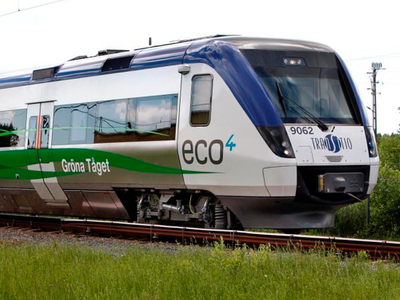Introduction to railway technology. Track technology. Rail vehicles - overview. The railway and the environment: energy consumption, air pollutions, external noise, external vibrations. Railway traffic development and future. Rail vehicles - technical basis. Aerodynamics and running resistance. Running gear, bogies and car body tilting. Traction technology: traction motors, transmission, traction mechanics and current collection. Braking technology. Car bodies. Passenger environment, interior design and auxiliary power. Internal noise, internal vibrations and climate resistance. Rail vehicle market and development.
SD2307 Spårfordonsteknik 7,5 hp

Do you want to make an impact on the climate crisis? The transport sector accounts for more than 25% of the global energy consumption, and the most impactful action to reduce this is to shift passengers and goods to the modes of transport with highest capacity and energy efficiency; which, for most operations, is Railways.
Rail Vehicle Technology gives an extensive overview to rail vehicles and their technical basis, while you as a student design a commuter-type train in a course-long project task. The lectures and the project task advance in parallel throughout the course, in a weekly basis, so that technical aspects used in the design of the vehicle are available to the students throughout the lectures and online recordings.
Additionally, the course offers an optional study visit to the SJ Hagalund depot, so that you can see and feel in reality how different rail vehicles are, linking theory and simulations from the course to real life engineering practice.
Nyckelord (sv): spårfordon, fordon, tåg, järnväg, komponent, design
Information per kursomgång
Välj termin och kursomgång för att se aktuell information och mer om kursen, såsom kursplan, studieperiod och anmälningsinformation.
Kursplan som PDF
Notera: all information från kursplanen visas i tillgängligt format på denna sida.
Kursplan SD2307 (HT 2010–)Innehåll och lärandemål
Kursinnehåll
Lärandemål
The course gives a short introduction to railway systems and then focuses on rail vehicles.
The course aim is to give you the fundamentals of railway systems and, in particular, to describe the components and functions of rail vehicles as well as the various demands a rail vehicle must fulfil. The course should give you a good platform for work in the field of railway engineering.
After a completed course you should be able to:
- clarify the different parts in railway systems and their possibilities and limitations
- explain how bogies, carbody tilting, traction and brake systems work and can be improved
- calculate train performance like acceleration and braking capacity, average speed and energy consumption
- determine outer dimensions and interior design for a train at a given operational task
- discuss the trends and future potential for railway traffic
Kurslitteratur och förberedelser
Särskild behörighet
150hp i teknik och dokumenterade kunskaper i engelska motsvarande Engelska B /Engelska 6.
Rekommenderade förkunskaper
150 university credits (hp) In engineering or natural sciences and documented proficiency in English corresponding to English B.
Utrustning
Kurslitteratur
Compendium on Rail Vehicle Technology, Div. of Rail Vehicles, KTH.
Examination och slutförande
När kurs inte längre ges har student möjlighet att examineras under ytterligare två läsår.
Betygsskala
Examination
- PRO1 - Projektuppgift, 3,0 hp, betygsskala: P, F
- TEN1 - Tentamen, 4,5 hp, betygsskala: P, F
Examinator beslutar, baserat på rekommendation från KTH:s handläggare av stöd till studenter med funktionsnedsättning, om eventuell anpassad examination för studenter med dokumenterad, varaktig funktionsnedsättning.
Examinator får medge annan examinationsform vid omexamination av enstaka studenter.
The number of points achieved for TEN1 and PRO1 are summed. The final grade is based on this sum.Grading scale: A-F
Övriga krav för slutbetyg
Written Exam (TEN1; 4,5 hp; P/F), compulsory.
Project Task (PRO1; 3 hp; P/F), compulsory.
Möjlighet till komplettering
Möjlighet till plussning
Examinator
Etiskt förhållningssätt
- Vid grupparbete har alla i gruppen ansvar för gruppens arbete.
- Vid examination ska varje student ärligt redovisa hjälp som erhållits och källor som använts.
- Vid muntlig examination ska varje student kunna redogöra för hela uppgiften och hela lösningen.